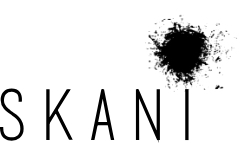With six composers and the Latvian Radio Choir, Skani offers us a ‘time stamp’ of the state of new Latvian choral music in 2023. The miracle – beyond the choir’s combination of technical expertise and human soul – is that we hear once again from composers with contrasting experiences, outlooks and technical habits who nonetheless so often manage to sound wholly Latvian.
There are a few things in play there – one of them the influential sound of the Latvian Radio Choir, bringing its hint of Orthodox depth and mysticism to the best of the Baltic Sea’s clean-lined professional chamber choir scene. Latvia’s regard for its own heritage as a singing nation and a deeply religious one is there, too: seven of the eight tracks here use sacred Latin texts. But there is little sense of tradition doing anything other than springing the compositional imagination forwards – even when, as in the title and opening track, Vasks’s Angele Dei, the texture is homophonic, the lines long and lyrical, and the quest, apparently, one for beauty (there are plenty of extended techniques elsewhere). For Vasks, the discovery of that beauty is never gratuitous. This piece and Actus caritatis underline the distinctive sound of the choir as much as reminding you how straightforwardly moving Vasks manages to be, even at his simplest.
The smaller the country, the easier it is to cultivate a national aesthetic incorporating plenteous variation. Krists Auznieks’s Sensus puts 24 voice parts in service of a fragment of St Paul’s Letter to the Romans with a sort of spectral spiritualism. Like many of his compatriots, Auznieks can suspend a cloud of voices in the air but this is fundamentally a piece whose revelations are harmonic. Two pieces by Andris Dzenītis are perhaps the most unmistakably Latvian of all. Om, Lux aeterna weaves pitch-bending voices from the bottom up into an extraordinary, dense, vibratory mass of sound that dissipates. Prayer is a homophonic hymn: bottom-heavy (again), anthemic, smouldering through its chant-like incantations.
Ruta Paidere’s setting of the Magnificat uses elements of Buddhist and Jewish chant and samples of Palestrina’s own setting, which can bring the feeling of a collage. Partnering it here is Santa Ratniece’s Nighttime Light, which sets the Nunc dimittis, the most technically radical piece on the album but one that still mines that fertile Latvian seam of pained lyricism and settles into a thick-set harmonic chassis to support the final melismatic ‘lumen Domine’. Mārtiņš Viļums’s The Fate of King Lear’s Children (not after Shakespeare but assembling texts from various sagas and legends) has a theatricality not present in other works here, voices apparently dismembered as they pursue the contrasting polyphonic agendas of the composer’s signature ‘microsonorism’ but with no sense of ill-discipline in the writing or the execution. It only proves how every single singer deserves their place in this remarkable and highly distinctive ensemble.
Andrew Mellor
www.gramophone.co.uk, 10/2024
_____________________________
Last year I reviewed the Latvian Radio Choir and Sigvards Kļava’s award-winning disc of choral music by John Cage. I hadn’t known what to expect – but it was a revelation and deserved its acclaim. With this new album they are back on home turf, singing music by Baltic composers, some known to me and some not, all the pieces in premiere recordings. The best known is Pēteris Vasks, who has two tracks: the stunningly poised and luminous Angele Dei which opens proceedings, sung with wondrously long-breathed phrases, and the somewhat less memorable Actus Caritatis. They are both in Vasks’ familiar rich tonal style, and his spiritual, contemplative mode is found in several of the pieces, even where their musical language leans more to the avant-garde.
More sonically adventurous than the Vasks is Krists Auznieks’ Sensus, a large-scale piece with rich chromatic harmony, glissandos and other effects, solo voices emerging from the chordal texture to sing phrases from St Paul. It is very striking, and virtuosically sung. Where these other tracks are predominantly about harmony, Ruta Paidere’s Magnificat focuses on melody. But not conventional western melody, rather incantatory lines that embrace Jewish synagogue chant in a dense polyphonic web.
As with Vasks, there are two pieces by Andris Dzenitis. Om, Lux Aeterna from 2012 combines echoes of Russian Orthodox church music with the strangeness of John Cage, the gravelly low basses really excelling, while Prayer is a simple, humble hymn in which time stands still. As it does in Mārtiņš Viļums’ The Fate of King Lear’s Children, an example of the technique he dubs “microsonorism”. It is peculiar, spacious like the Vasks but much more unsettling, archaic and monumental, dramatic in an unshowy way. Conductor Sigvards Kļava wants this album to mark the state of Latvian music today. It does this not only in terms of the range of composers represented, but also in the quality of the choral singing by a national choir the nation can be proud of.
Bernard Hughes
www.theartsdesk.com, 31/08/2024
______________________________
Superb choral singing, extraordinarily immaginative writing for voices. Mind expanding sounds, remarkably controlled singing and the acoustics of St Johns Church in Riga framing everything.
Andrew Mellor
BBC Radio 3 Record Review, 31/08/2024

.jpg)